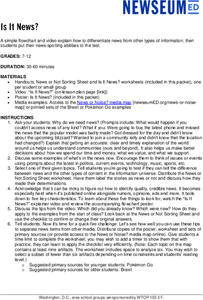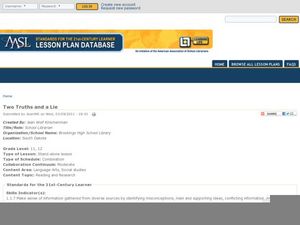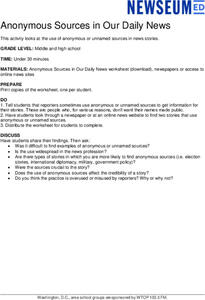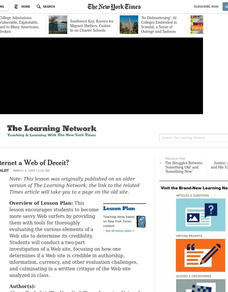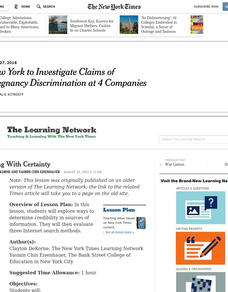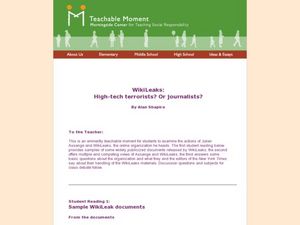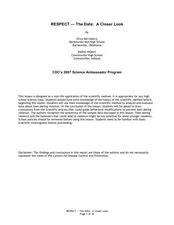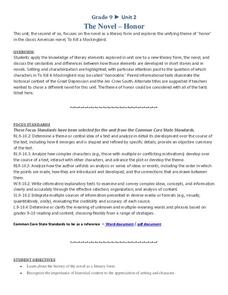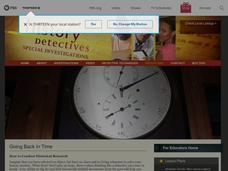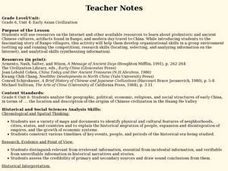Newseum
Putting the Consumer's Questions to Work
Who, what, when, where, why, and how are good questions to ask when evaluating a source. First, scholars find two sources of information relating to a chosen topic. Next, pupils complete a worksheet to gauge the source's credibility....
Newseum
Is It News?
Is it news or not? That is the question young journalists must consider in a lesson plan about newsworthiness. Class members watch a short video that details five key characteristics of quality, credible news. Individuals then use these...
Curated OER
Two Truths and a Lie: Internet Research Skills
It's tough for high schoolers to assess what is a credible resource and what is not. A helpful resource prompts class members to research a particular topic and record two facts—and create one lie—while documenting the sources. They then...
EngageNY
Mid-Unit Assessment: Analyzing an Author’s Argument and Text Structure
William Shakespeare: a writer, a poet, a fake? For their mid-unit assessments, scholars read an excerpt from the article "The Top Ten Reasons Shakespeare Did Not Write Shakespeare" by Keir Cutler. Next, they analyze the author's argument...
Newseum
Anonymous Sources in Our Daily News
Young journalists search for two examples of news stories, either published or online, that use anonymous or unnamed sources. They then consider the possible motives for why the sources remain unidentified, the types of stories that use...
Curated OER
Express Yourself Lesson Seed 8: Character
Characters often change over the course of a story or novel. Use the sample graphic organizer provided here to track how the narrator has responded to the sequence of events in chapter four through six of The Cay. In addition to this...
Shmoop
ELA.CCSS.ELA-Literacy.W.11-12.7
Your pupils are beginning their research project and are having a hard time narrowing their topics down. If you’re not sure how to help them, then start here. Provided is a student dialogue that works though the issues of narrowing a...
Curated OER
Is the Internet A Web Of Deceit?
Students become more savvy Web surfers by evaluating the various elements of a Web site to determine its credibility. They conduct a two-part investigation of a Web site, focusing on how one determines if a Web site is credible in...
Curated OER
Searching with Certainty
Learners explore ways to determine credibility in sources of information. In small groups, students develop a thesis question for a research paper, then use three different methods to find Internet sites with credible information.
Curated OER
Propaganda: Making a Commercial
Seventh graders study different propaganda techniques. In groups, they write and perform a 60-second TV or radio commercial. Classmates rate the effectiveness of the commercial and whether or not they might buy the product.
Curated OER
Stealing Second: History in the Making
In this Stealing Second: History in the Making lesson, students evaluate the internet and newspaper as separate and credible resources. Students analyze Clemente as a baseball player and humanitarian. Students create a class timeline...
Curated OER
Shadow Ball
Students view a film about baseball and calculate the time required for a variety of operations that take place in baseball. They use the calculations to stage a credible game of Shadow Ball and reflect on the challenges for arranging...
Curated OER
Viral Invaders
Students conduct a critical investigation of the West Nile Virus. They assess the relationship between the sources of information and their credibility. Students use their findings to create a public health campaign about the virus.
Curated OER
WikiLeaks: High-tech terrorists? Or Journalists?
Students investigate the credibility of WikiLeaks. In this history lesson, students read three WikiLeak articles, then answer questions that relate to each article.
Curated OER
Respect--The Data: A Closer Look
Students explore the steps in the scientific method process. In this science lesson, students identify warning signs that someone is in an abusive dating relationship. They evaluate the credibility of information sources.
Curated OER
Delivering a Persuasive Speech
To prepare to deliver a persuasive speech, class members examine not only how to craft a speech, but consider body language, articulation, pronunciation, pitch, pace, and volume as well.
California Academy of Science
Nuclear Energy: What's Your Reaction?
OSHA confirms that rules governing worker safety at nuclear power plants ranks higher than worker safety in offices. Scholars must consider safety, cost, alternatives, and other factors before recommending whether a town should build a...
Willow Tree
Multiplying and Dividing Monomials
Apply the power of mathematics to the power expressions. The lesson gives examples of expressions that utilize each of the exponent rules to simplify. Once seeing the exponent rules individually, scholars combine them to simplify an...
West Jefferson High School
The Novel — Honor
For classes tackling To Kill a Mockingbird, this lesson plan sets readers up for discussions or essay writing with questions and prompts. The prompts encourage individuals to explore beyond the novel itself, looking at photographs from...
While They Watched
Teaching the Holocaust
What is the difference between prejudice and discrimination? Between collaborators and bystanders? Guilt and responsibility? Prompt learners to think critically about a very complex and textured topic with an innovative packet of materials.
PBS
Going Back In Time
History detectives eschew that time machine and follow the paper trail to go back in time to investigate an unfamiliar object. The goal is for class members to develop their skills as historical detectives.
EngageNY
Researching Digital Sources, Part 1: Guided WebQuest
We are living in a technical world. Scholars learn how to examine digital resources for their research on DDT. They explore a list of websites using a Digital Resources on DDT sheet. Learners examine their research notebook to determine...
Curated OER
The Battle of the Experts
Learners view the "Smoking Gun" video as an illustration of someone claiming to be an expert who really is not one. They discuss the fact that some experts also come with biases and personal agendas. Students research experts from...
Curated OER
Banpo Village: Gone, But Not Forgotten
Sixth graders plan a trip to China and prepare yourself for the Banpo excavation site competition by studying prehistoric and ancient Chinese history.



